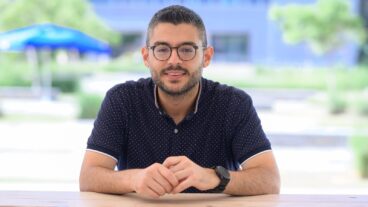“My role is to help open doors and to help realize the educational and scientific dreams of the university community.” Sarah Stroumsa, the new rector of the Hebrew University. Photo by Yoram Aschheim.When Professor Sarah Stroumsa’s appointment as the first woman rector of Hebrew University of Jerusalem was announced, she received dozens of letters and e-mails from well-wishers. In addition to congratulating her, many were eager to share with her their own dreams and visions for the university.
Rather than being put off or threatened by so many outside proposals and in keeping with her own low-key, unassuming style, Stroumsa was excited by the fact that there were so many people who wanted to contribute something to the university community. She was thrilled by the openness and creativity displayed by her university colleagues and students.
“Some of the ideas were wonderful. My role is to help open doors and to help realize the educational and scientific dreams of the university community,” says Stroumsa, 58, who took over the position at the beginning of October. “People have lots of ideas and I want to hear them.”
With her open, infectious smile and unpretentious manner, it is easy to see why people felt so comfortable sharing their dreams with Stroumsa, a professor in the departments of Arabic Language and Literature and of Jewish thought.
Stroumsa’s field of expertise is philosophy and religious thought in the medieval Islamic world, with a focus on the intellectual exchange between Jewish and Muslim religious thinkers. She is director of the Friedberg Genizah Project’s, Philosophy, Theology and Polemics in the Genizah group, and is on the steering committee of Intellectual Encounters: Philosophy and Science in the World of Medieval Islam.
Stroumsa, who was deputy rector at the university before taking on her new post, has visions of her own for the university which has been her home for so many decades.
Developing an elite university
“My feeling of connection and love for this institution is profound,” Stroumsa tells ISRAEL21c. “It is a big responsibility but I think it is wonderful to continue to develop an elite university and to establish new areas in research and academic leadership in Israel and internationally. Everything I want to do, I will do together with the academic community. I want to work together as a team.”
The responsibility on the university, which is entrusted with the education of the next generation of young citizens and academic leaders, is huge, she says. She believes the university already provides a fantastic disciplinary education, but adds that she would like to strengthen the liberal arts studies component, much as is done in universities and colleges in the United States, but which is largely neglected in Israeli universities.
“We have a very high standard of education and give the students direction and a certain ethos. Students who have completed their undergraduate degrees at the Hebrew University are accepted into very competitive doctoral degrees abroad, even without a Master’s degree, but I would like to widen the cultural horizons of people who will not necessary go into academic research,” she says. “I would like to support ‘out of the box’ thinking and also ‘out of the academic discipline’ thinking.”
Unlike American universities, which offer one major and one minor for four years of study, Israeli undergraduate university students choose two majors and complete their studies in three years, leaving very little room for elective courses.
“We have to find a way to work within that [framework] without compromising the accomplishments we already have,” says Stroumsa, noting that a team is already at work looking into the possibilities together with the deans of each faculty.
Stroumsa, who was born in Haifa, began her academic career at the Hebrew University in 1977. When she started her undergraduate studies she wasn’t planning an academic career, but one summer she made a spur of the moment decision to take an Arabic course. She fell in love with the language and the literature, and her course of studies changed. Over time it soon became very apparent to her that her future lay in academia.
Being rector of Hebrew University is a demanding job, and Stroumsa’s decision to take on the role was made with the support of her husband, and two daughters. “The decision to present myself as a candidate came with the support of my family. Without my family I don’t have anything,” she says. “They have given me a lot of support.”
Stroumsa has a strong sense of community. For 16 years she has been meeting her colleagues in Classical Judeo-Arabic Culture bimonthly for coffee, conversation and communal learning.
She would like to see the same sense of community strengthened at the university in other disciplines as well. “The fantastic thing about being in the university is that you are working within a community, but the university is not small and most people concentrate on their own work in their labs and libraries,” she explains.
Like other universities in Israel, the Hebrew University must work within the limited budget allotted by the government. In the last few years, the Treasury has continuously cut the budget, and the last three years have been especially difficult, notes Stroumsa, who plans to put aside her own academic research for the time being.
The miracle of Israel’s higher education
“All higher education in Israel is a miracle. We achieve amazing research results with research budgets which are only a small fraction of our colleagues’ budgets in the United States and Europe,” she says. “But there are also limits to miracles and miracles need to be fed.”
Stroumsa is entering her position at a difficult time. The worldwide financial crisis is likely to have a big impact on higher education and Stroumsa admits she is “deeply concerned” about the governments’ ability and willingness to provide the funds needed to maintain the university’s academic excellence. She worries that students might lost precious years of study.
“I am deeply concerned that even if we get the entire budget that we need at the moment, we still have a few years of damage done to the students’ long term education when their studies were not conducted as they should be,” she admits.
Stroumsa, whose husband is also a professor at the Hebrew University in the department of Comparative Religion, joins only a handful of women leading academic institutions in Israel. She believes, however, that women will not truly be regarded as equals until the time that a woman’s appointment to a high academic post is not even remarked upon as unusual.
“The position is the position – choose whoever can do it best and then let them do it as best they can,” says Stroumsa.
“The Hebrew University is a wonderful university, and whenever I am abroad I keep comparing and feeling very proud of our achievements. I still have to remind myself that I am the rector of this superb institution,” she says. “But we can’t sit on our laurels. It is very important to open our eyes to see the good things others are doing as well and take a leading position within the international academic community.”












